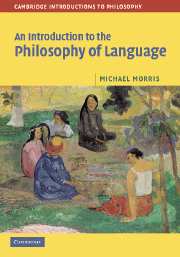Book contents
- Frontmatter
- Contents
- Acknowledgements
- Introduction
- 1 Locke and the nature of language
- 2 Frege on Sense and reference
- 3 Russell on definite descriptions
- 4 Kripke on proper names
- 5 Natural-kind terms
- 6 Quine on de re and de dicto modality
- 7 Reference and propositional attitudes
- 8 The semantics of propositional attitudes
- 9 Davidson on truth and meaning
- 10 Quine and Davidson on translation and interpretation
- 11 Quine on the indeterminacy of translation
- 12 Austin on speech acts
- 13 Grice on meaning
- 14 Kripke on the rule-following paradox
- 15 Wittgenstein on the Augustinian picture
- Glossary
- Works cited
- Index
Introduction
Published online by Cambridge University Press: 05 June 2012
- Frontmatter
- Contents
- Acknowledgements
- Introduction
- 1 Locke and the nature of language
- 2 Frege on Sense and reference
- 3 Russell on definite descriptions
- 4 Kripke on proper names
- 5 Natural-kind terms
- 6 Quine on de re and de dicto modality
- 7 Reference and propositional attitudes
- 8 The semantics of propositional attitudes
- 9 Davidson on truth and meaning
- 10 Quine and Davidson on translation and interpretation
- 11 Quine on the indeterminacy of translation
- 12 Austin on speech acts
- 13 Grice on meaning
- 14 Kripke on the rule-following paradox
- 15 Wittgenstein on the Augustinian picture
- Glossary
- Works cited
- Index
Summary
What is language? What is it for words to have meaning? What is the meaning of words? These are the basic questions of the philosophy of language. And here's a natural-seeming way of answering them. Language is a system of signs which we use to communicate with each other. Communication is a matter of letting other people know what we think. The signs which make up language get their meaning from our associating them with the thoughts we want to express. The meaning of words of common languages, such as English or French or Japanese, is a matter of a convention among speakers to use them with agreed associations.
Something very much in the spirit of that natural-seeming way of answering these basic questions was proposed by John Locke at the end of the seventeenth century. Recent philosophy of language is most simply understood by considering where it stands in relation to Locke's view. The most decisive shift came with the judgement – associated most obviously with John Stuart Mill and Gottlob Frege – that our words concern things in the world, rather than things in our minds. So complete has this transformation been that it is now accepted as simply obvious that one of the central things which has to be understood in the philosophy of language is how language relates to the world. That major change apart, however, there are significant points of overlap between Locke's view and the standard assumptions of contemporary philosophers of language.
Information
- Type
- Chapter
- Information
- An Introduction to the Philosophy of Language , pp. 1 - 4Publisher: Cambridge University PressPrint publication year: 2006
